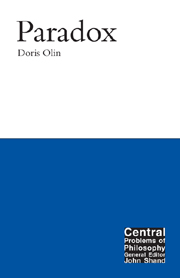Book contents
3 - Believing in surprises: the prediction paradox
Summary
I think that this flavour of logic refuted by the world makes the paradox rather fascinating. The logician goes pathetically through the motions that have always worked the spell before, but somehow the monster, Reality, has missed the point and advances still.
The paradox
A teacher announces to her student S that she will give him exactly one examination during the next week, and it will be a surprise: S will not be able to predict, prior to the day of the examination, on which day it will be held. The student, a star logician, objects that this is impossible. He argues as follows. “If the exam were held on Friday, then on Thursday evening, realizing that no examination had yet been given, I would reasonably expect it on Friday; hence a Friday examination would not be a surprise. But, if the examination were given on Thursday, then on Wednesday evening I would be aware that no examination had yet been given and, recognizing that it cannot be given on Friday, would expect it on Thursday; so a Thursday examination would not be a surprise. Similarly for the remaining days. Consequently, the surprise examination cannot be given - you cannot do what you said you would do.”
The teacher, visibly shaken, declines to answer, and cancels the class in order to think. On Tuesday of the next week, she presents the student with an examination whose first question is “Is this test a surprise?” Grudgingly, S recognizes that he must answer in the affirmative.
- Type
- Chapter
- Information
- Paradox , pp. 37 - 60Publisher: Acumen PublishingPrint publication year: 2002

